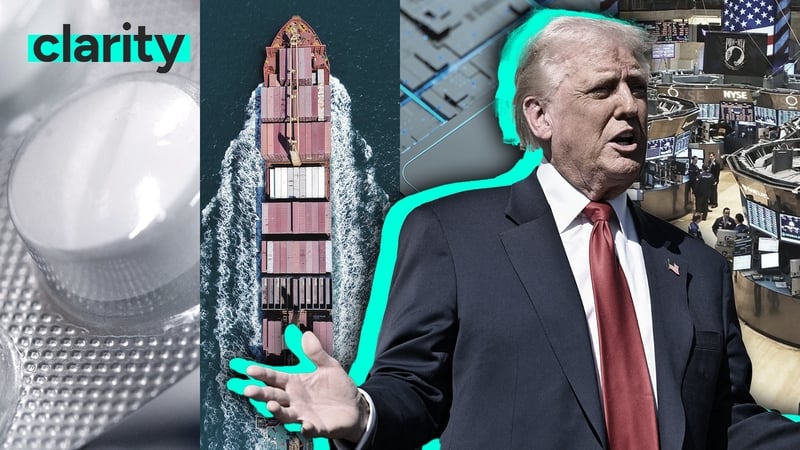US President Donald Trump has turned international trade on its head with his swathe of tariff announcements.
RTÉ News Economics and Public Affairs Editor David Murphy examines some of the key issues around how President Trump’s trade policies could play out.
Ireland ‘took our’ pharma companies
Donald Trump’s statement that “Ireland was very smart, they took our pharmaceutical companies away”, is not quite true.
Mr Trump has repeatedly suggested that Ireland has taken the US’s pharmaceutical industry.
While the US President is partial to embellishment, the reality is there are 90 plants involved in drug manufacturing in Ireland compared to 1,500 in the US. Large pharmaceutical companies have facilities around the world.
But it is certainly true that Ireland has benefited enormously from US drug manufacturers. Irish sales of pharmaceutical goods to the US were a massive €44bn last year, making it the country’s biggest export to the US.
Donald Trump has repeatedly threated a specific tax on drugs made outside the US and suggests it could be in the region of 25%. The Irish Government wants discussions about tariffs on pharmaceuticals to be folded into broader negotiations covering all EU goods.
However, last weekend US Commerce Secretary Howard Lutnick ruled that out.
He told ABC News that sectoral tariffs planned for pharmaceuticals were “not available for negotiation” and would be separate to trade talks on reciprocal tariffs involving the EU.
He echoed the notion that the US has lost its drug manufacturing and said: “We need to make medicine in this country. We learned that during Covid.”

A pause that isn’t really a pause
The Trump administration “paused” tariffs of 20% on imports from the EU, while negotiations on a new trade deal are under way for 90 days. In the interim, it has replaced the 20% duty with a 10% baseline tariff on most goods. But for many Irish exporters the 10% tariff represents a steep increase.
Multiple significant exports from Ireland are affected, including whiskey and butter. Irish food and drink exports to the US America are valued at €1.9bn annually. But much stiffer tariffs of 25% are being applied to other EU countries which make cars, steel and aluminum.
When the chips are down, is moving the semiconductor industry to the US viable?
Computer chips are the bedrock of the 21st Century and vital components in laptops, phones and modern cars.
Here, Ireland is very exposed. Fifteen of the world’s top 30 semiconductor supply chain companies have operations in this State, and the microelectronics sector employs more than 20,000 people, according to the IDA.
The biggest player is Intel which has poured €30bn into Ireland, including €17bn spent on its plant in Leixlip, Co Kildare.
While the US has exempted chips from tariffs temporarily, it plans to apply a special duty on semiconductors in future. Much of what is made by companies such as Intel is part of a process finished elsewhere.

The key question is at what point will taxes be imposed?
Frequently, tariffs only apply on finished products. However, the US recently introduced duties on car parts and finished vehicles. So, it is possible the Irish semiconductor industry could be negatively affected.
Donald Trump wants to move much of this industry to the US. But he is not the first. His predecessor Joe Biden introduced the US Chips Act to incentivise production in the US. But will it work?
Chipmaking giant Taiwan Semiconductor (TSMC) has faced a huge challenge in finding skilled staff for its landmark $165bn Arizona plant which has benefited from $6.6bn of US government funding.
The company announced an apprenticeship programme to train employees, in conjunction with Arizona’s governor. But the message is that establishing chip manufacturing in the US is a long and difficult process due to a skills shortage.
President Trump says tariffs are ‘going very well’
The dollar has fallen by 10% against the euro since January, the US stock market is down 11% from its peak in February. At the height of the recent chaos, the cost of borrowing in the US surged from 4% to 4.5% in just a few days.
Donald Trump’s sudden U-turn this month, when he put massive tariffs on hold for all countries excluding China, calmed the markets somewhat.
But investors simply don’t buy his argument that punitive taxation on goods imported by the US is sound economic policy.
The real test will be whether Donald Trump can negotiate multiple complicated trade deals in the coming weeks without reverting to huge tariffs and another damaging showdown with the markets.




